The Fairmount College newsletter is published two times a year. For information, contact Cheryl K. Miller, writer and coordinating editor, at 316-978-6659 or cheryl.miller@wichita.edu.
Photo credits: Cheryl K. Miller; courtesy photos; Wichita State University Libraries, Special Collections and University Archives
Newsletter Section Menu
Community Engagement Partnerships Dean's Message Science Olympiad National Tournament Staff Spotlight: Jill Fisher College Outreach and Recruitment Anthropology Outreach Activities Student Accolades Tenure and Promotion Activities Faculty and Staff Accolades In Memoriam Briefs
Fairmount College engages the community through industry and nonprofit partnerships
Students, faculty, and local businesses and agencies all benefit from industry partnerships. Participants learn contemporary theory and practices, as well as discover and apply new knowledge.
Dean Andrew Hippisley would like to further boost benefits for all involved.
“Every single discipline has value for industry, for business and for non-profits,” Hippisley said. “We’re doing our research and we’re doing these wonderful things, but we don’t always interact with the people who are applying our research and applying our teaching.”
Hippisley is actively seeking and encouraging the establishment of meaningful engagement opportunities that will reduce knowledge and application gaps. One way is to create student internships.
Creating opportunities for students
Pierre Harter, associate vice president for research operations, industry and defense programs, envisions many partnership opportunities for students on Innovation Campus.
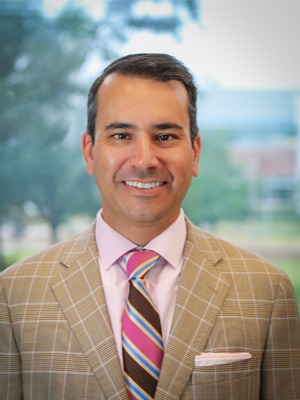
“As we push into artificial intelligence and machine learning, I can see humanities and social sciences students playing a part in how we address bias and testing validation of artificial intelligence, machine learning, and deep learning frameworks and systems,” Harter said.
Harter also sees room for human factors psychology and other liberal arts and sciences students to be involved on projects where hardware and software solutions are designed for customers, such as robotic/automation manufacturing cells.
Beyond the opportunities already provided to students on campus through NetApp and the Bureau of Alcohol, Tobacco and Firearms, for example, local entities are hoping to engage with students. Successful partnerships will build demand for more.
Some of these partnership opportunities could include internships where students and employers work together on accessibility support, product testing, social media marketing, or training and development, according to Brian Austin, Wichita State’s director of applied and experiential learning.
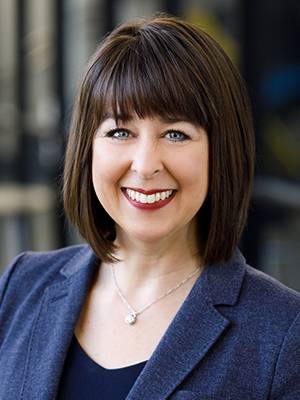
Angela Dudley, senior associate vice president for corporate and foundation relations for Wichita State’s Foundation, believes the type of engagement with industry partners is unparalleled.
“Through these collaborations, we can foster a profound sense of belonging for our students,” Dudley said, “knowing that our community partners genuinely care and provide support for their future.”
Engagement on a broader level
Hippisley wants to create opportunities that will benefit industry employees, community members and faculty, too.
Industry partnerships could include training or classes provided for employees by Fairmount College faculty, Hippisley said. The beginner’s business French course tailored to the needs of Airbus employees is one such example. Another is the new partnership between COMCARE and the School of Social Work, in which current qualified COMCARE employees complete a master’s degree in social work and become licensed social workers.
Another possibility is engagement with special populations, such as prison inmates. Whether it be creative writing or philosophy classes, or another discipline, this kind of community engagement provides meaningful experiences to people with limited resources and outlets for expression. It also helps fulfill the aspect of the college’s mission to foster curiosity and lifelong learning.
“Creative writing classes in prisons, that's a hugely valuable emotional and psychologically meaningful experience for prisoners,” Hippisley said.
Hippisley thinks college departments could also learn something from industry colleagues.
“We need to listen to our industrial partners because they have a different agenda,” Hippisley said. “Our (college) agenda is long term discovery. What we produce is usually on the way to discovering something that may have fruition in 20 years' time. Industry’s timeline is immediate. They have profits to make and we need to understand their perspective.”
Not only that, Hippisley said, the formation of advisory boards for each department could be beneficial for the connection, and for the direct communication about industry standards and practices.
Hippisley believes so strongly in the importance of advisory boards that he has charged each department with creating one by the end of this academic year.
"Advisory boards would be able to engage with the department and give the industrial perspective,” Hippisley said. “With that advice, the department might make adjustments to the curriculum. They might explore applied learning opportunities and they might, with the help of the advisory board, create internships.”
A sampling of community engagement experiences
Airbus Business French course
Considered a global leader in aeronautics, space and related services, Airbus has several facility locations, including the Innovation Campus; Mirabel, Quebec; and Toulouse, France. This past summer, Wichita State offered a business French class for beginners, tailored specifically for Airbus employees who would be traveling to French speaking locations. Rachelle Swilley, lecturer, taught employees conversational phrases and vocabulary that would help them navigate French-speaking work environments, travel venues and restaurants.
“We partner with industries to create not only useful classes,” Rocio Del Aguila, chair of the modern and classical languages and literatures department, said “but also fun things that their people would like to learn, let’s say skills for their lives.”
Center for Educational Technologies to Assist Refugee Learners
In part, CETARL works with resettlement agencies such as the International Rescue Committee, community leaders, and providers of English as second language classes to create equitable opportunities for refugee and asylee learners.
The center's work focuses on creating novel and innovative digital technologies that help refugee and asylee learners learn English and STEM curriculum, and other aspects of integration in a new society. This unique form of community engagement involves several Wichita State faculty, undergraduate and graduate students, collaboration with KU faculty, community partners, and other stakeholders. CETARL’s mission is to provide free, accessible education for all by developing digital-game based learning platforms for children, youth and adult learners.
"To truly make education equitable and accessible for everyone, we need to rethink the one-size-fits-all educational model and provide safe and welcoming educational spaces for children and adults who have fled war and violence back in their home country and help them rebuild a new life successfully in the U.S.," Mythili Menon, associate professor of English and linguistics, and director of CETARL, said.
COMCARE
In 2023, Sedgwick County entered into an education program agreement with Wichita State to provide current COMCARE employees an opportunity to obtain a Master of Social Work degree. The School of Social Work will provide the instruction for the program, and the county will monitor student progress and pay market-based tuition and fees for each employee under the agreement.
"This partnership with COMCARE and the School of Social Work creates a bridge from our campus to the city. By having this partnership, we are able to provide better learning opportunities for our students while also building community connection and support to individuals,” said Ndii Kalomo, director of the School of Social Work.
Industrial Math Clinic
Through the Industrial Math Clinic, undergraduate and graduate students work under the supervision of faculty to solve problems for industry partners requiring expertise in mathematics, statistics or physics. According to Ziqi Sun, chair of the department of mathematics, statistics and physics, industry partners save money by having students work on these problems, whose solutions will bring immediate or future economic returns to the company. The math department gets funding from the business for solving their problems, while MSP faculty will learn new industrial mathematics problems. They will also explore new ideas and directions for their own research, which may lead to future National Science Foundation funding. Additionally, MSP faculty may present workshops or seminars to industry partners on special topics courses for degree credit. Emprise Bank was IMC’s first client and partnered with the math department to establish the Data Science Lab.
“Students gain experience solving real-world projects that will be useful in their future job search,” Sun said. Emprise Bank has hired at least one student who worked on its project in the Data Science Lab.
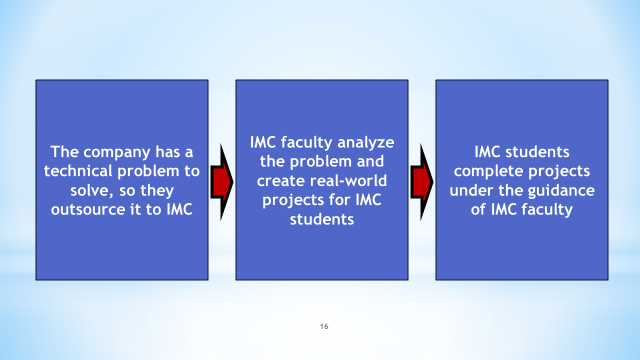
Marketing for small businesses
The Elliott School of Communication hires students who work directly with local businesses and non-profits to create videos, websites, social media campaigns and other materials. To create more opportunities for students to do this work, the ESC recently connected with the Small Business Development Center, an advising and training center housed at Wichita State that works with small businesses in 11 counties in southcentral Kansas.
“It’s a win for the business because they’ll get content that they need for their business, while the students will get experience,” Jeff Jarman, KHF Distinguished Chair of the Elliott School of Communication, said. “We can do all these things for them so they can focus on building and growing their business.”
Return to Newsletter Section Menu
Dean's Message
Dear Fairmount College alumni, faculty, staff and friends:

Just before the beginning of the fall semester, I invited all the college chairs and directors to a half-day retreat to think seriously about how we might be more engaged with our community: industry, business, non-profits, and city. We discussed engagement along three dimensions:
- Research and scholarship, bringing our expertise to our partners to solve concrete context-sensitive problems
- Trainings, bringing our expertise to educate a specific workforce in a specific domain
- Internships, bringing our students to our partners to apply what they have learned in the classroom and lab to what they do in the workforce
Each of these, of course, has mutual benefit. Our faculty can learn about industrial problems that have academic solutions; our instructors can develop teaching materials that use cases from the world of business; and our students can obtain crucial professional experience and professional confidence.
We heard from several departments who have been successful in one or more of these areas. For example, the Department of Mathematics, Statistics and Physics has established an industrial math clinic and is partnering with a local bank to help it work through high-level data science problems because they lack the staffing resources and expertise to do it alone, and using academic expertise is good for the bottom line. The Department of Modern and Classical Languages and Literatures put together a business French course for Airbus, an Innovation Campus partner, to prepare its employees to manage a French-speaking workforce in Quebec. And the School of Criminal Justice has developed a robust set of internships in a multitude of domains including the district attorney’s office, public defender’s office, Wichita and Derby police departments, and juvenile corrections.
Wichita State University President Rick Muma in his fall 2023 address talked about WSU’s campus being the city of Wichita itself: “The city is our campus.” This makes us unique among the Kansas Board of Regents schools. Our college embraces the vision of the university:
- to provide relevant applied learning experiences that meet the needs of the community
- to elevate Wichita State as a premier, urban public research university
Strengthening the college’s community engagement along the dimensions of research, training and student applied learning will help us support these university-wide goals. We were privileged to have joining us at our community engagement retreat Angela Dudley, senior associate vice president of corporate and foundation relations, and Pierre Harter, associate vice president for research operations, industry and defense programs. They are guiding us into unfamiliar spaces, making the important connections, and showing us how to view community engagement as relationship building and partnership. We know that our research and scholarship, our curriculum and our students are assets that can bring benefit to the community; but we also know that our community is a unique resource that we can access to elevate our research, educational and service missions.
Yours,
Andrew Hippisley, Dean
Return to Newsletter Section Menu
Science Olympiad National Tournament brings thousands together on campus to celebrate science
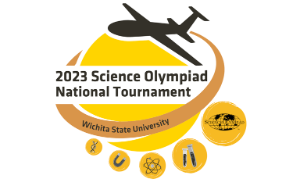
Imagine nearly 2,000 young science enthusiasts building wheeled vehicles, bridges and rubberband-powered aircraft, solving crime scenarios, or working steadily with teammates on written exams.
The tween and teen builders and investigators came to Wichita State in May 2023 to compete against STEM teams from across the United States and Japan.
Their families and coaches cheered them on and encouraged them during the Science Olympiad National Tournament. Along the way, students learned valuable skills that will aid them in STEM courses and careers. One of the nation’s most prestigious STEM competitions, Science Olympiad is comprised of knowledge events designed by experts covering topics in engineering, ecology, physics, epidemiology, astronomy, chemistry, meteorology and coding.

“Students participating in the Science Olympiad National Tournament represent the best of the best, often following career pathways in STEM and becoming leaders in their fields,” said Jenny Kopach, Science Olympiad CEO. “I am grateful for our partners at Wichita State University and Kansas Science Olympiad for giving our 121 teams a platform on which to display their talents.”
The 2023 tournament was the first in-person national tournament since 2019.

During the worst of the COVID-19 pandemic, students competed remotely.
“2023 was a big deal for these students,” Jill Fisher, community outreach coordinator and SONT co-director, said, “especially for the middle schoolers who had never been to an in-person national tournament.”
Andrew Hippisley, dean, was especially pleased with the event experience for students and their guests.
"The national tournament exceeded all our expectations. There were 7,000 guests on campus including the students, coaches, families and non-competing teams from local schools,” Hippisley said. “And I have never seen such an excited group of kids running around campus practicing their various events. They were soaking in what will be a college experience for them in a year or two's time.”
The enormity of the tournament required widespread university support and the work of hundreds of volunteers.
“The other wonderful thing about the national tournament was that it brought the university community together," Hippisley said. “It was a win for Wichita State as the host site and for the potential for these students in science to become future Shockers.”
Youthful energy and science exploration
Fisher, who is also the Kansas Science Olympiad director, said the magnitude of the event encourages high energy levels from its participants.
“It’s a bigger deal than state tournament because there the students just come that day and compete. We have the awards ceremony and then they're off on their merry way,” Fisher said. “But for the national tournament, you essentially have this block party leading up to the tournament day.”
The day before the national tournament competitions, students and their families participated in many on-campus activities.

At the STEM Expo, attendees learned about Wichita State, toured lab facilities, and discovered research conducted by faculty and staff. Students also went on campus tours and spoke with admissions representatives. Some toured other university attractions such as the Lowell D. Holmes Museum of Anthropology and Go Create in the John Bardo Center.
“We had a very high energy opening ceremony that evening, where Dean Hippisley gave the opening speech,” Fisher said. After the parade of states, students heard from keynote speaker Steve Jacobs of Faraday Studios and Midnight Science Club.

Jake, Wizard IV, as he is known locally, is a fellow of the Royal Institution of Great Britain, and a fellow of the American Institute of Chemists.
“Jake was an excellent speaker to have with these students,” Fisher said. “He really stressed to them about getting outside of their comfort zones and taking risks, taking chances. A lot of people were touched with his message about also making sure that you're doing good for the world at the same time.”
Competing, then returning home
During the tournament, students competed from early morning until afternoon. After results were tallied, students learned their placements at the award ceremony.
"A great thing about nationals is that the first place winners get special prizes or scholarships from sponsors the national office has. It’s a very special thing to witness those students being presented with those awards right then and there,” Fisher said. Kennedy Middle School from Cupertino, California, and Adlai E. Stevenson High School from Lincolnshire, Illinois, took home the designations of national champions.
Science Olympiad originated in Michigan and Delaware, and the national tournament’s 40th anniversary in 2024 will be hosted by Michigan State University. Visit www.soinc.org for more information about the 2023 and 2024 national tournaments.
Kansas Science Olympiad encourages, challenges students
When young Kansas scientists need more than what their classrooms can provide in middle and high school, participation in Science Olympiad helps fill the gap.

"Science Olympiad encourages students to delve into areas of science that aren't covered in the general curriculum simply due to time constraints,” Keegan Hallmark, Science Olympiad coach and Andover Middle School science teacher, said. “Students have often found passions in a new area of science as they become engrossed in a small niche that they might not have thought about before.”
Wichita State hosts the state competition in April each year. Area middle and high school students begin preparation as soon as classes begin in the fall, trying out for a place on the team and diving into content as varied as dendrology, propulsion and coding.
Science Olympiad’s breadth of events and activities makes the program accessible to many students. Weekly team practices prepare students for competitions in 23 areas. Depending on the students' interests and expertise, some will compete in hands-on lab activities. Others will build devices to activate in front of judges and spectators. Some team members may take written exams to assess their depth of science knowledge on a topic.

Science Olympiad can be a great avenue for young scientists to explore and see what might be possible. It also allows them to develop their potential.
“I have seen students outgrow their peers from sixth grade to high school graduation," Tim Elsen, Science Olympiad coach and Wilbur Middle School science teacher, said. “Science Olympiad helps students learn the benefits of practicing, build cooperation skills as a collaborative team, and sharpen leadership skills much like any orchestra, band, or athletic program.”
Students start the path to competition by participating in invitationals, or practice tournaments, according to Jill Fisher, community outreach coordinator and the Kansas Science Olympiad director.
“The teachers put invitationals together and run them as practices for their students,” Fisher said, “and they invite other teams to come along, either to give them extra opportunities to practice or to sometimes use as a fundraiser. "

Student teams must first win their state and regional level championships before they can compete at the national level. Students from Blue Valley North High School and Pleasant Ridge Middle School (both in Overland Park) won their competitions and were able to compete in the national tournament at Wichita State in May 2023.
Another aspect of the Science Olympiad program is that it sometimes leads to careers in STEM.
"Science Olympiad gives more opportunities and information to those students to explore beyond what they learn in the classroom,” Fisher said. “There are other ways that it ties into science that you can study and develop into a career.”

Elsen agrees.
“My students work with college professors, engineers, and scientists around the state where these connections lead to future careers," Elsen, the Wilbur coach, said. “These students get a taste of success within this program that seems to last beyond their high school years.”
There’s something for everyone involved in Science Olympiad, including the team coaches. Usually, teachers fill that role.
“As a coach, I feel that the greatest joy is seeing students find success in something that they didn't think they could do. I enjoy challenging the students and pushing them to try something new," Hallmark, the Andover coach said. “Regionals and state competitions are a celebration of their hard work. We are very fortunate to offer Science Olympiad as an extracurricular that is not only academic, but functions like an athletic competition where we get to build camaraderie.”
The 2024 Kansas Science Olympiad state competition will be held April 6 on the Wichita State campus. Several spectator events will be open to the public. For more information, visit the Kansas Science Olympiad homepage.

Staff Spotlight: Jill Fisher
A gregarious older brother encouraged Jill Fisher’s participation in Science Olympiad. Because of his influence, the program soon became a valuable experience for her, with opportunities far beyond what she could have imagined.
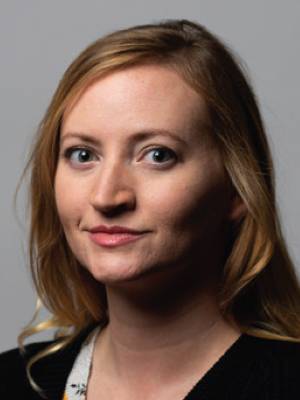
“I tell people what you learn in school, in middle school and high school, is just the tip of the iceberg of science and what you can do with that,” Fisher said. Now the community outreach coordinator and Kansas Science Olympiad director, she acknowledges the influence Science Olympiad had on her life and career choices.
“It made a huge impact on my life,” Fisher said. “Our team practiced together every day after school, pretty much the whole year, and we also went to nationals most years. I traveled with them across the country and it was a good connection with like-minded people.”
Those connections have lasted at least 20 years. When Fisher sent out the call for hundreds of volunteers to help with the 2023 national tournament, a former teammate signed up.
“He came up to help with nationals. Science Olympiad pretty much spurred him to go into STEM. It was really cool to see someone I hadn't seen in 20 years. We competed together on the same team and now he's an engineering professor at OU,” Fisher said.
Fisher also went into STEM fields when she entered the workforce, holding lab positions in the area at ICM, Inc and Hospira (now Pfizer). When the opportunity arose, she took a position teaching science at Kapaun Mt. Carmel High School. Eventually she found her way to Wichita State, and worked for several years as the STEM Outreach Coordinator of the Fairmount Center for Science and Mathematics Education.
Fisher holds a bachelor of arts degree in biochemistry and secondary education from Tabor College and a master of education in learning and instructional design from Wichita State.

Science Olympiad.
Return to Newsletter Section Menu
College outreach and recruitment activities help develop the talent pipeline
Jill Fisher, community outreach coordinator, likes to start the recruitment pipeline early, especially for girls interested in STEM areas.
Much of Fisher’s work involves events that bring middle and high school students to the university. In academic year 2022-2023, it amounted to about 5,500 students. That’s in addition to the 2,000 or so she met during middle and high school visits.
“It’s getting that presence at WSU with them, so they'll feel comfortable and consider coming to WSU for post-secondary work,” Fisher said.” It’s also just introducing the students to a variety of areas that they can study and focus on.”
One of the ways Fisher exposes students to Wichita State is through encouraging their participation in competitions she coordinates, such as the North American Computational Linguistics Open Competition or Kansas Science Olympiad.
Andrew Hippisley, dean, believes these on campus events have tremendous influence on students' perceptions of the Wichita State environment and opportunities available to them here.
“I hope students go home excited at what they saw,” Hippisley said. “I hope that we give them a chance to dream a little bit, to realize that there is a point to all the hard learning that they have to do. It will result in the ability to explore way beyond their wildest dreams.”
“They can come to us and see something extremely exciting, something in a lab, an experiment going on or some piece of work that someone's done, or some piece of writing,” Hippisley said. “It can get them on the path of dreaming that they have an ability to one day do that themselves, and therefore they'll put in the hard work in high school so that they have that opportunity.”
Fisher also regularly informs teachers and counselors of events academic departments host, such as French Immersion Day, Watkins Visiting Professors, Constitution Week, and potential guest speakers who may visit classrooms to talk about careers in criminal justice, for example.
“For those who are local, we have so much that’s available,” Fisher said.
Recruiting girls to STEM careers
A 2017 study conducted by the London School of Economics found that across Europe, girls aged 11 become keen on science and related careers, but lose that interest when they turn 15. Fisher sees some similarities in the area youth she works with.
“Sixth grade is that magic grade to get students,” Fisher said. “I participate in a lot of girls and women in STEM events, and once those students get into middle school, the girls no longer see themselves doing science.”
Kim Hovey, a fifth-grade teacher at Nelson Elementary School in Haysville, supports early science outreach efforts.
“Students love having hands-on experience with STEM, and many say they love science,” Hovey said. “WSU's program plants a seed for students to enjoy science, which I enjoy seeing happen.”
“If you can get the girls before they get into middle school and then help them develop an interest, that makes sixth grade the target age, and that’s also true for getting students interested in college,” Fisher said.
Return to Newsletter Section Menu
A sampling of educational outreach activities
Expanding Your Horizons
The Techbridge Girls’ Expanding Your Horizons Conference is a one-day event introducing middle school girls to a variety of science, technology, engineering and mathematics areas. Attendees meet STEM role models, participate in hands-on activities, and learn more about careers in those fields.
“EYH provides an opportunity to expose girls to the diverse careers of women in STEM, especially those who are marginalized,” Moriah Beck, professor of biochemistry and EYH coordinator, said. “Currently fewer than 50% of high school girls know a woman working in STEM. Role models help the girls see themselves in STEM roles, helping to dispel negative stereotypes.”
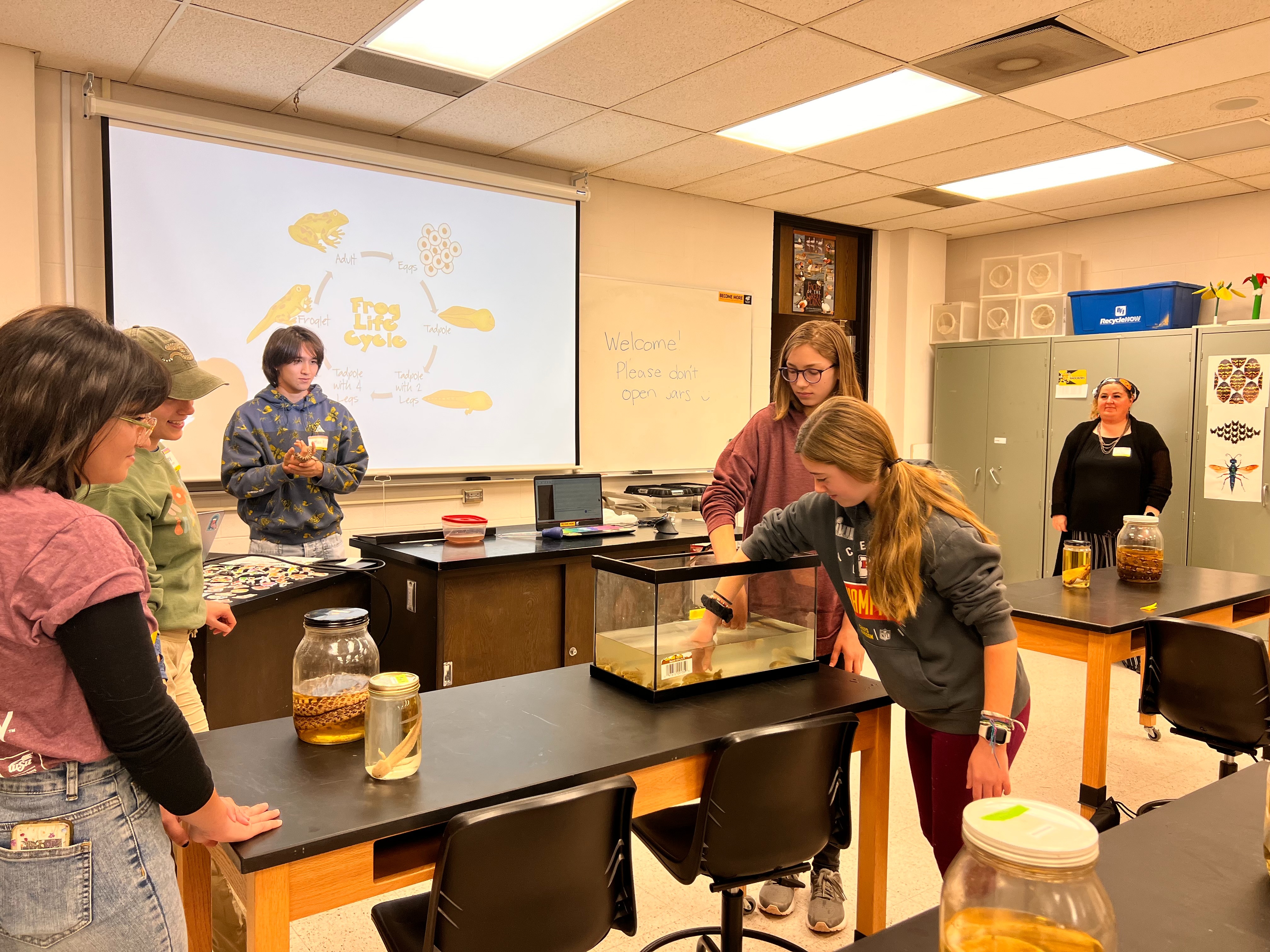
French Immersion Day
Wichita State’s French language program annually hosts a French immersion day, “Allons-à-WSU!” (Let’s go to WSU!) for local students studying French. Approximately 200 students from Wichita and Wichita-area high schools participate and compete in activities and games. Events include Pétanque (Bocce); Manie Musicale (Music Mania); Pictionnaire (Pictionary); and Chasse au Trésor (Scavenger Hunt). Students also hear from WSU Admissions and Study Abroad representatives.
“Students get to see the campus concretely and become familiar with it. By playing Pétanque and by engaging in a scavenger hunt, they see the outdoors layout,” Brigitte Roussel, associate professor of French and “Allons-à-WSU!” coordinator, said. “By playing Pictionary in the RSC, they get to see and become familiar with the place where WSU students hang out outside of class; by voting on their favorite French and Francophone songs during Music Mania, they see one of our theaters used for performances.”
Sonya Kovalevsky Day
Sonia Kovalevsky Day is an all day, all female, all math event for middle and high school students meant to inspire females in middle or high school to pursue a career in mathematics or another STEM field. Sonia Kovalevsky Day is designed to empower the next generation of female mathematicians, scientists, engineers and innovators. The event includes hands-on workshops on 3D printing, fractals and juggling.
“Girls get to see and understand that there is a community of women working in STEM and that we are very interested in having them join us,” Catherine Searle, professor of mathematics and event coordinator, said. “It also allows the math department to foster a positive relationship with Wichita Public Schools. I currently visit two middle school math classes at Marshall Middle School once or twice a month to engage with students and teachers in math-related activities similar to those featured at SK Day.”
Return to Newsletter Section Menu
Anthropology outreach activities encompass wide range of ages
Budding anthropologists from the age of first graders through senior citizens have an opportunity to learn more about cultures when they visit the Lowell D. Holmes Museum of Anthropology.
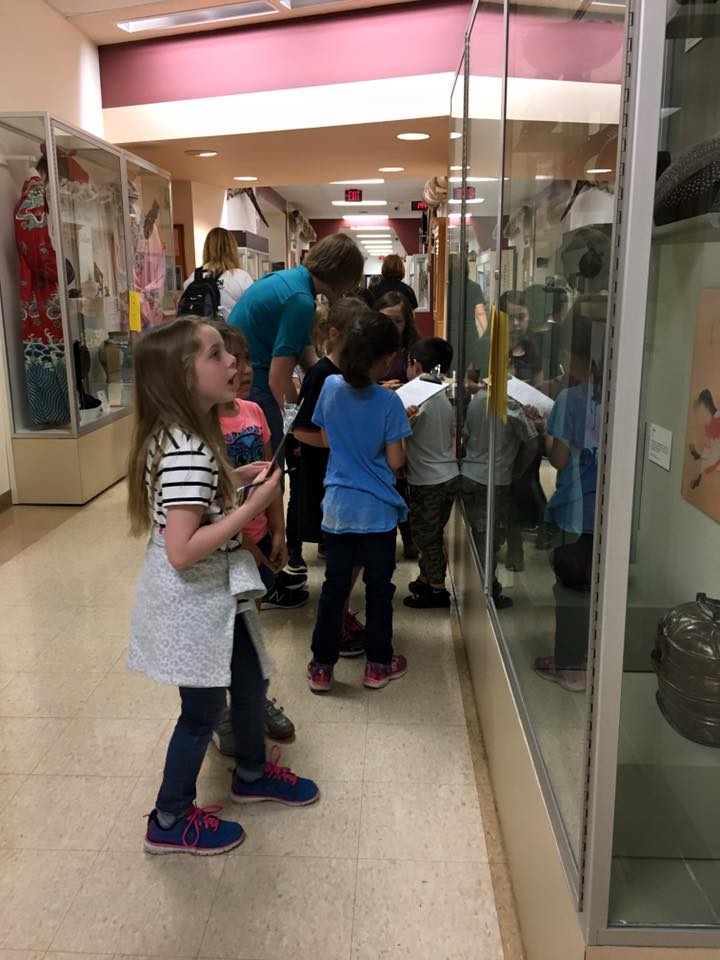
Students as young as first graders come to the Holmes Museum to learn about cultures.
The outreach focus of the museum is primarily for field trip groups in fourth through eighth grades, but encompasses all K-12 grades and the public, according to Rachelle Meinecke, museum director. Working with such a such a range of ages requires adaptability in the kinds of topics covered and materials shown. For example, fourth graders might participate in a scavenger hunt.
“Following a brief presentation about anthropology, the students watch a short video about the Asmat, learning where they live, what they look like and what they do,” Meinecke said. The Asmat live in Papua, New Guinea. “Usually I’ll pull out some artifacts for them to see and then we’ll go through the galleries and talk about differing parts of the world. Then we’ll do the scavenger hunt. It makes them read about the exhibits and really look at them and find different things.”
In comparison, a local first grade class participated in a hands-on activity based on the Maasai people, who inhabit regions of Kenya and Tanzania.
“We talked about the Maasai people, where they live, what their houses look like, and the Maasai necklace,” Meinecke said. “We did a craft project with a white paper plate and cut out the center. Each color in the Maasai necklace represents something like bravery or friendship or being outside. They got to color their necklace for whatever represented themselves. And then we did a picture scavenger hunt with them.”
Meinecke and her students also do classroom visits and career fairs, in part as recruitment opportunities.
"We talk about our department and university, but also about museum professionals. One student created an Asmat traveling trunk for an MA project and designed complete lesson plans,” Meinecke said. “In the future, I would like to develop more of those kinds of educational trunks that we can take out into schools and into the community to talk about archaeology or about different cultures.”
Additionally, Meinecke gives public outreach programs to engage the community.
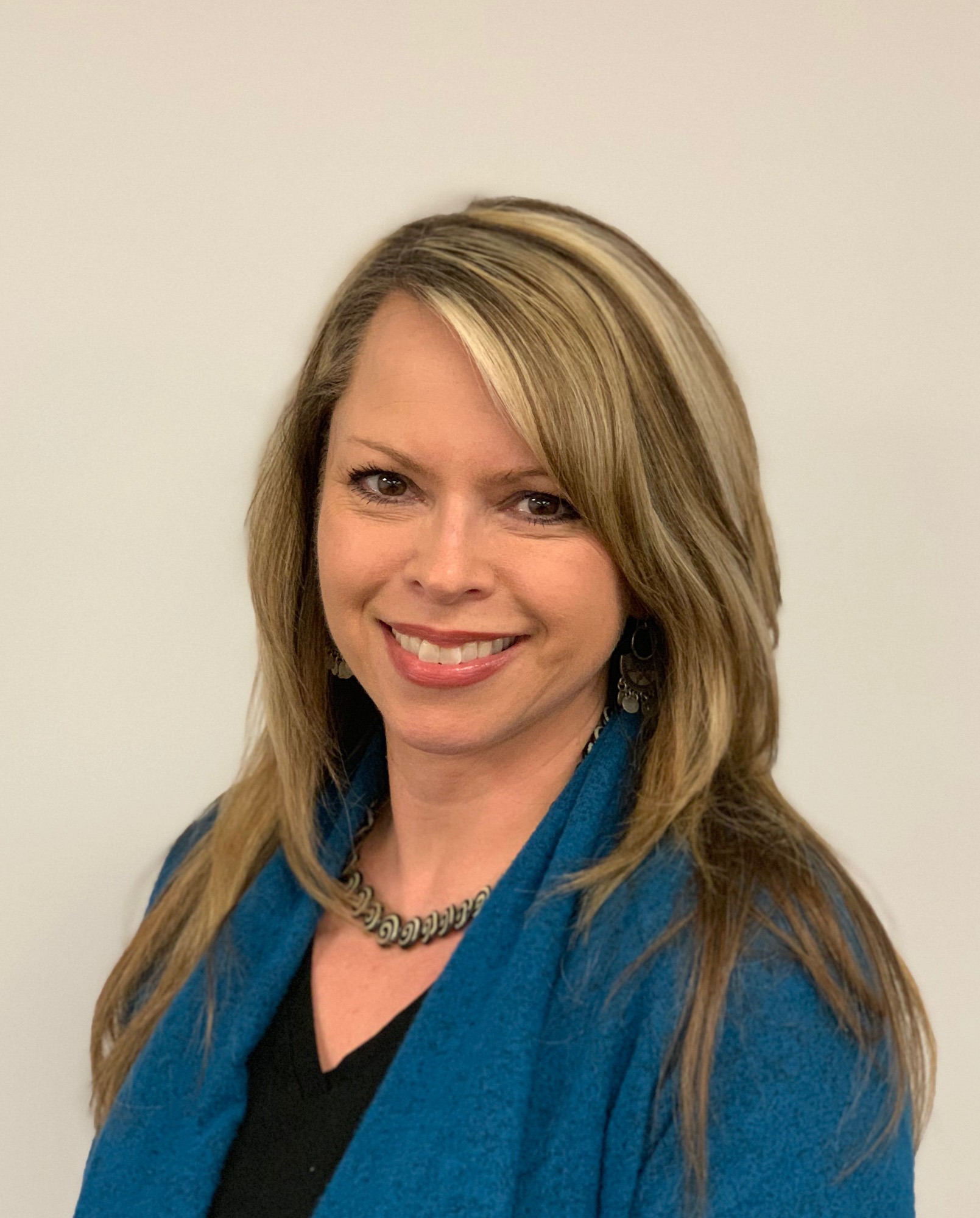
“I did a lifelong learning class a couple of years ago about preserving your family heirlooms,” Meinecke said. “We have some amazing ancestral Mayan Guatemalan weaving, some that are really interesting to talk about. I did a Senior Wednesday program on the Yoruba culture in Africa and some pieces in conjunction with an exhibit that was going on at the Ulrich Museum of Art.”
The Holmes Museum was developed in the 1960s by long-time anthropology professor Lowell Holmes. It began as a collecting and teaching museum, for students to learn how to interpret material objects, how to take care of them, and how to exhibit them, Meinecke said. With the exception of Meinecke, museum staff are students, and they learn all aspects of museum work. For more information about the Holmes Museum, visit www.wichita.edu/holmesmuseum.
Student accolades
Mark Meyer was awarded the 2023 Department of Mathematics, Statistics, and Physics Outstanding Graduate Teaching Award.
The 2023 Wichita State Collegiate Mathematics Competition team placed third in competition at Bethany College. The team consisted of Kubeshavarsha Kalithasan, Kevin Nguyen, and Evan Wing.
Several Wichita State students majoring in geology gave presentations at the Annual Meeting of the Geological Society of America in Pittsburgh. They included Julia Schwartz, Jack Dalton, Gavin Grams, Mitchell Baker, Eldon Taskinen, and Elaine Duff.
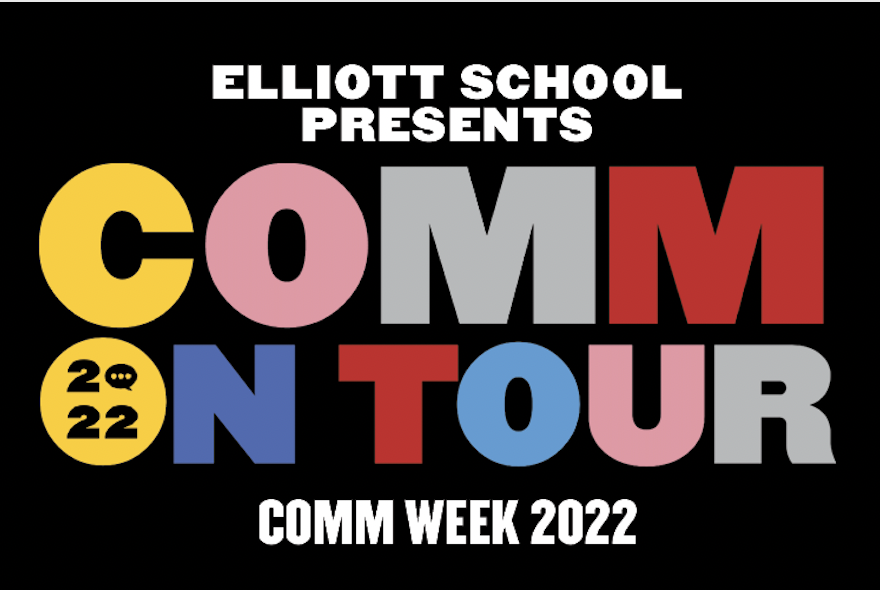
The Shocker Ad Lab won third place nationally in the 2023 National Federation of Press Women annual communication contest promoting "Comm On Tour" for Comm Week 2022. The campaign was created and produced by Leonora Kinkead, Caelin Bragg, Amanda Phanivong, and Jenna Rodehorst. Madeline McCullough, associate educator in communication and Jessica Newman, assistant educator in communication, guided and mentored their students in their work.
Return to Newsletter Section Menu
Tenure and Promotion Activities
Professor Incentive Review
Elizabeth Behrman, professor of physics
Mary Waters, Melba V. Hughes Distinguished Professor of English
Rhonda Lewis, professor of psychology
Robert Weems, Willard W. Garvey Distinguished Professor of Business History
Promotion to Professor
Doris Chang, professor of political science
Darren DeFrain, professor of English
Mary Liz Jameson, professor of biological sciences
Li Yao, professor of biological sciences
Non-tenure Track Promotion
Melinda DeFrain, associate teaching professor in English
Sirana Jamkartanian, associate educator in French and Arabic
Madeline McCullough, associate educator in communication
Jodie Simon, senior educator in sociology
Shirlene Small, senior educator in sociology
Nathan Thompson, associate teaching professor in mathematics
Tenure and Promotion to Associate
Patrick Bondy, associate professor of philosophy
Crystal Dozier, associate professor of anthropology
Jayme Johnson-Schwartz, associate professor of philosophy
Yuan Liu, associate professor of mathematics
Mythili Menon, associate professor of English and linguistics
Samantha Slade, associate professor of psychology
Return to Newsletter Section Menu
Faculty and Staff Accolades
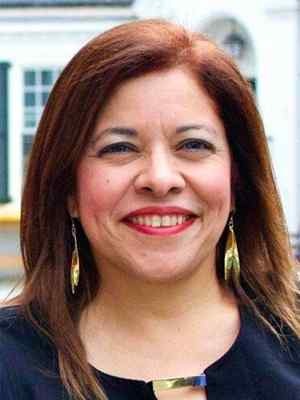
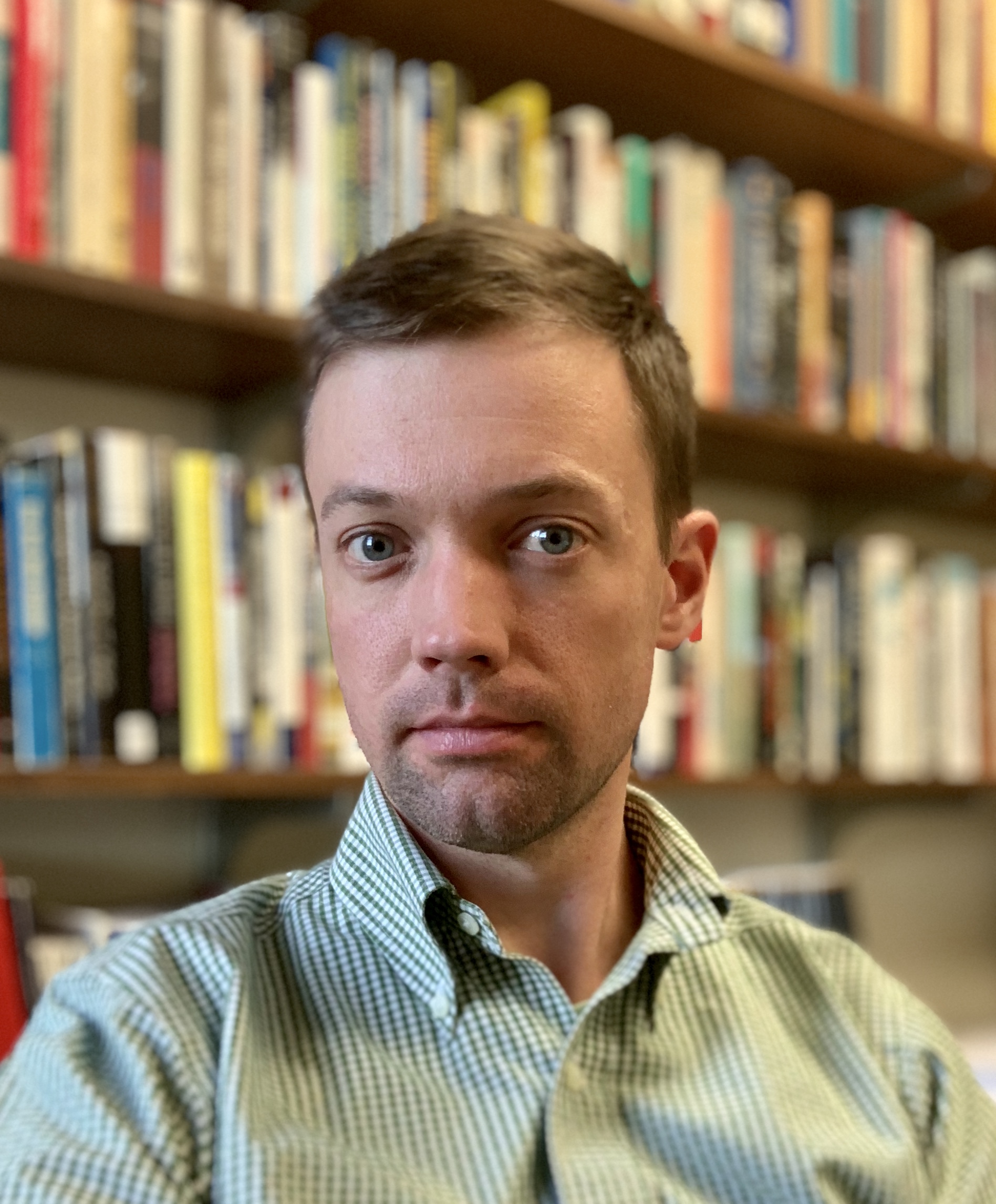
Kaytie Brozek, academic advisor, received the 2023 Kansas Academic Advising Network Service Award in recognition of significant contribution to the organization.
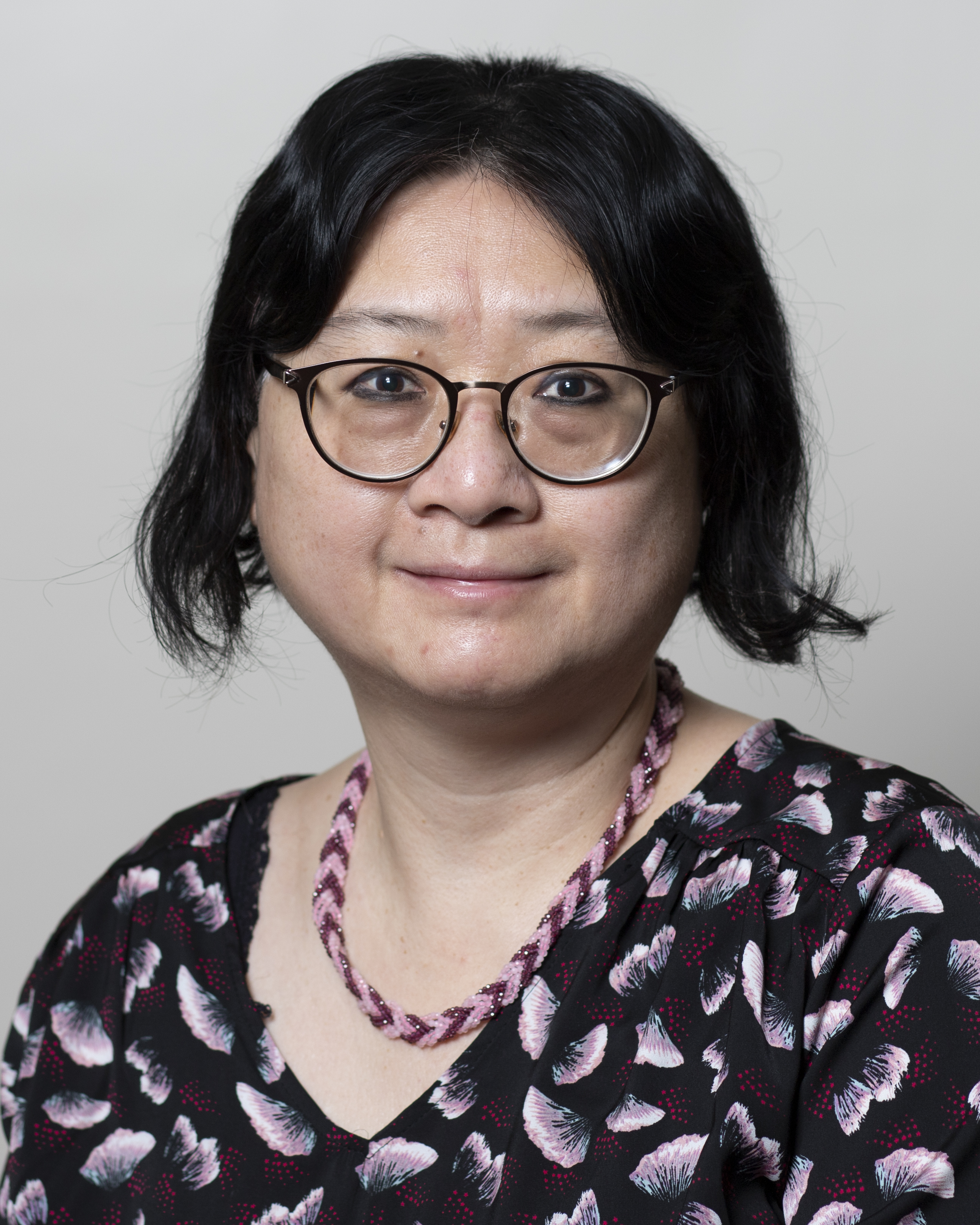
Doris Chang, professor of political science, has been selected as associate editor for the International Journal of Taiwan Studies.
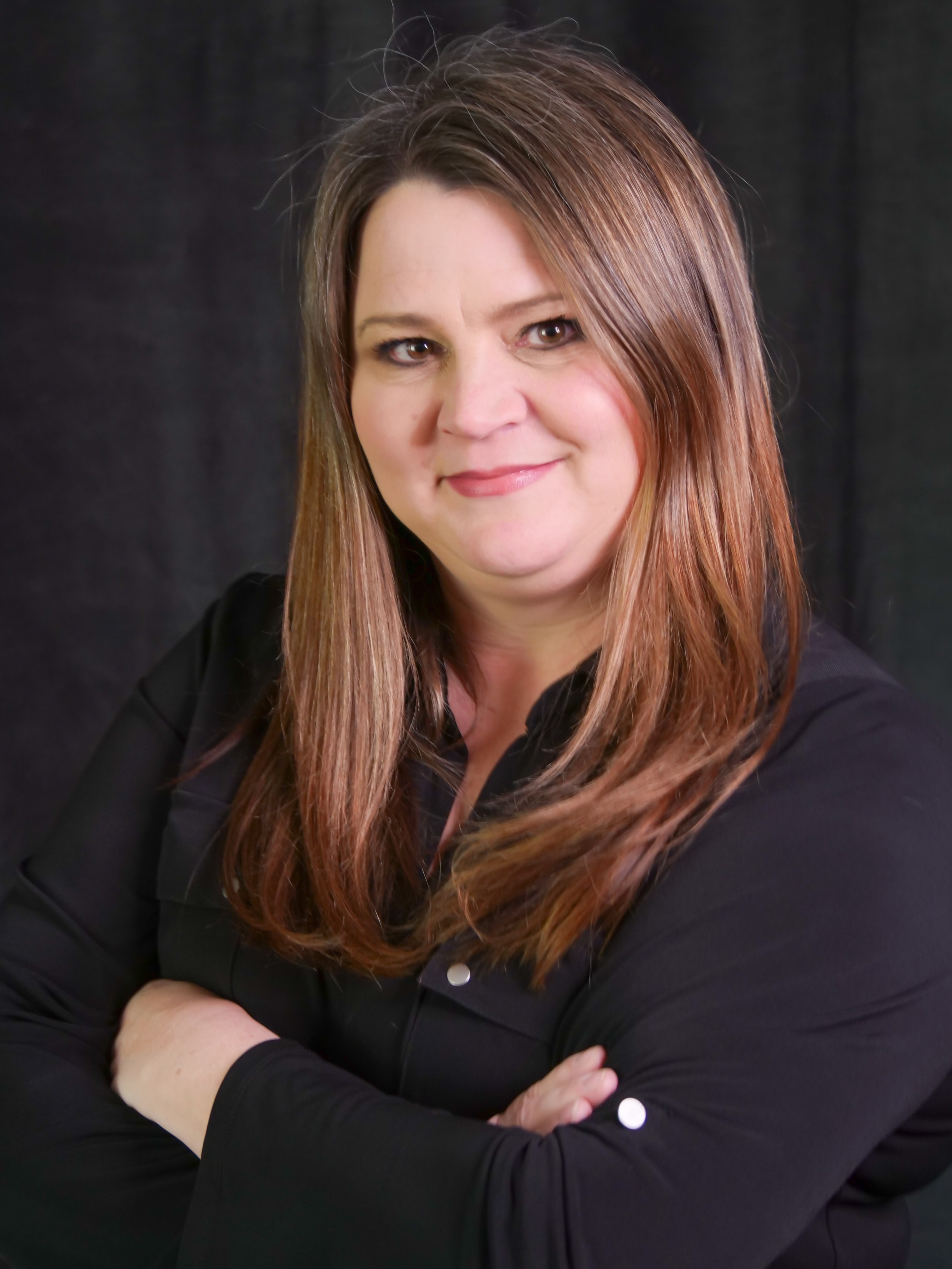
Amy DeVault, senior educator in communication, has been elected to serve a second 2-year term as president of Kansas Collegiate Media.
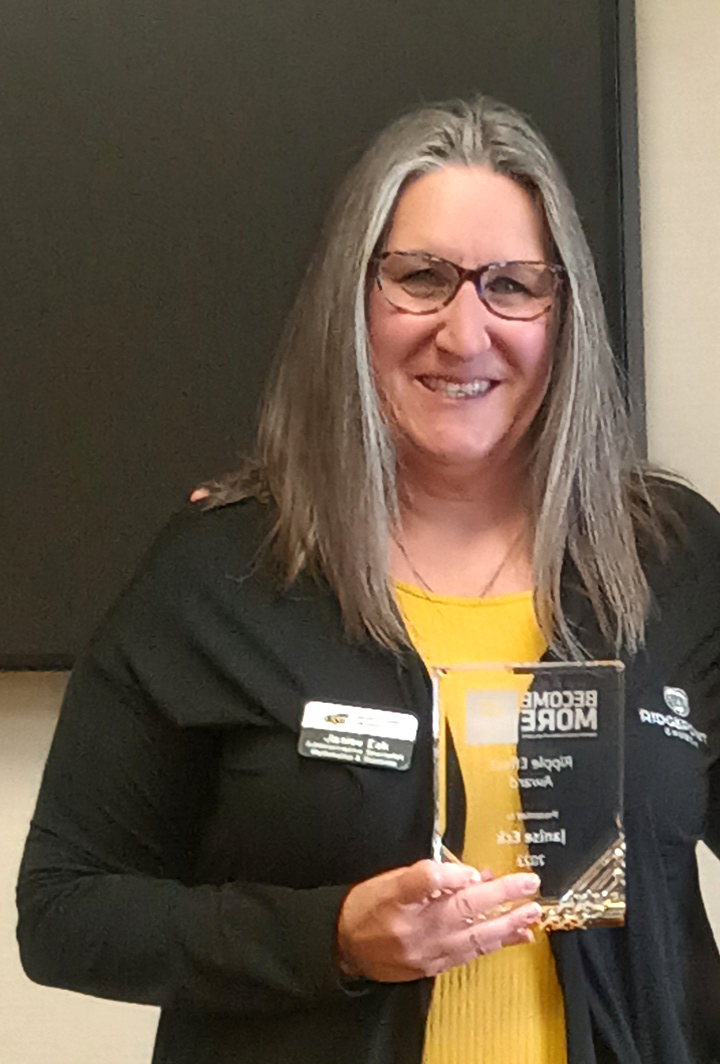
Janise Eck, administrative assistant, Department of Mathematics, Statistics and Physics, won the 2023 Ripple Effect Award presented by the Fairmount College Staff Council. The award acknowledges a staff member’s unique level of service to students, the department and Fairmount College.
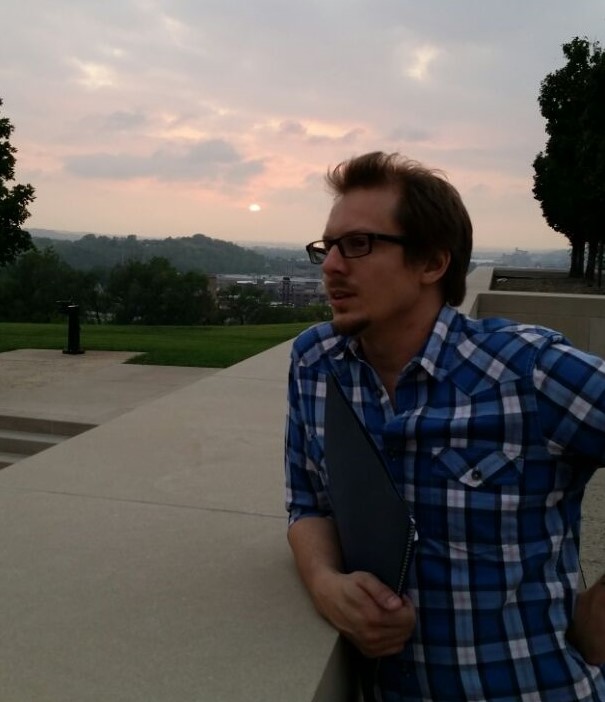
Jeff Hayton, associate professor of history, won Article of the Year designation for "Wutanfall: Emotional Entanglements of the East German Punk Subculture" in Canadian Slavonic Papers. The paper was selected by a jury and presented by the Canadian Association of Slavists.
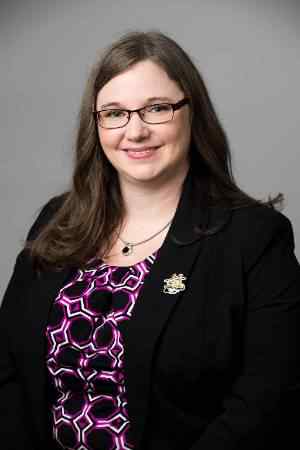
Bethany Kennedy, student program and business coordinator, Hugo Wall School of Public Affairs, won the Excellent Service Award presented by the Fairmount College Staff Council. It acknowledges appreciation for coworkers who make a difference at the department level.
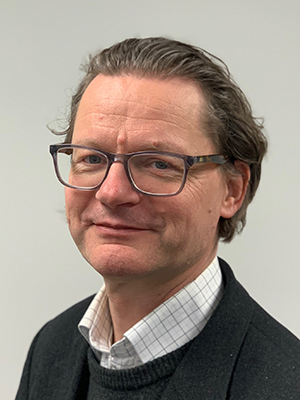
Jens Kreinath, associate professor of anthropology, gave the keynote lecture “Recognizing Human Dignity in Interreligious Relations: Saint Veneration Rituals at Shared Sacred Sites and the Aesthetics of Interrituality,” at the Europe Conference of the International Association of Mission Studies. Kreinath also gave the keynote “The Problem and Sources of Human Dignity: Contributions from the Black Sea Region and Beyond,” at the Faculty of Orthodox Theology, Babes-Bolyai University, Cluj-Napoca, Romania.
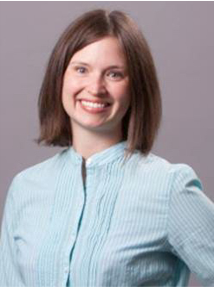
Katie Mitchell-Koch has been named the Talaty Endowed Research Professor in Chemistry.
Nyssa Owens, academic advisor was elected to serve a 3-year term as vice chair, chair, and past chair of the Kansas Academic Advising Network.
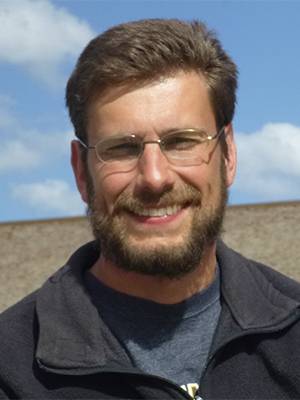
Will Parcell, associate professor of geology and department chair, has been elected to the 2023-2024 management board of the History and Philosophy Division of the Geological Society of America.
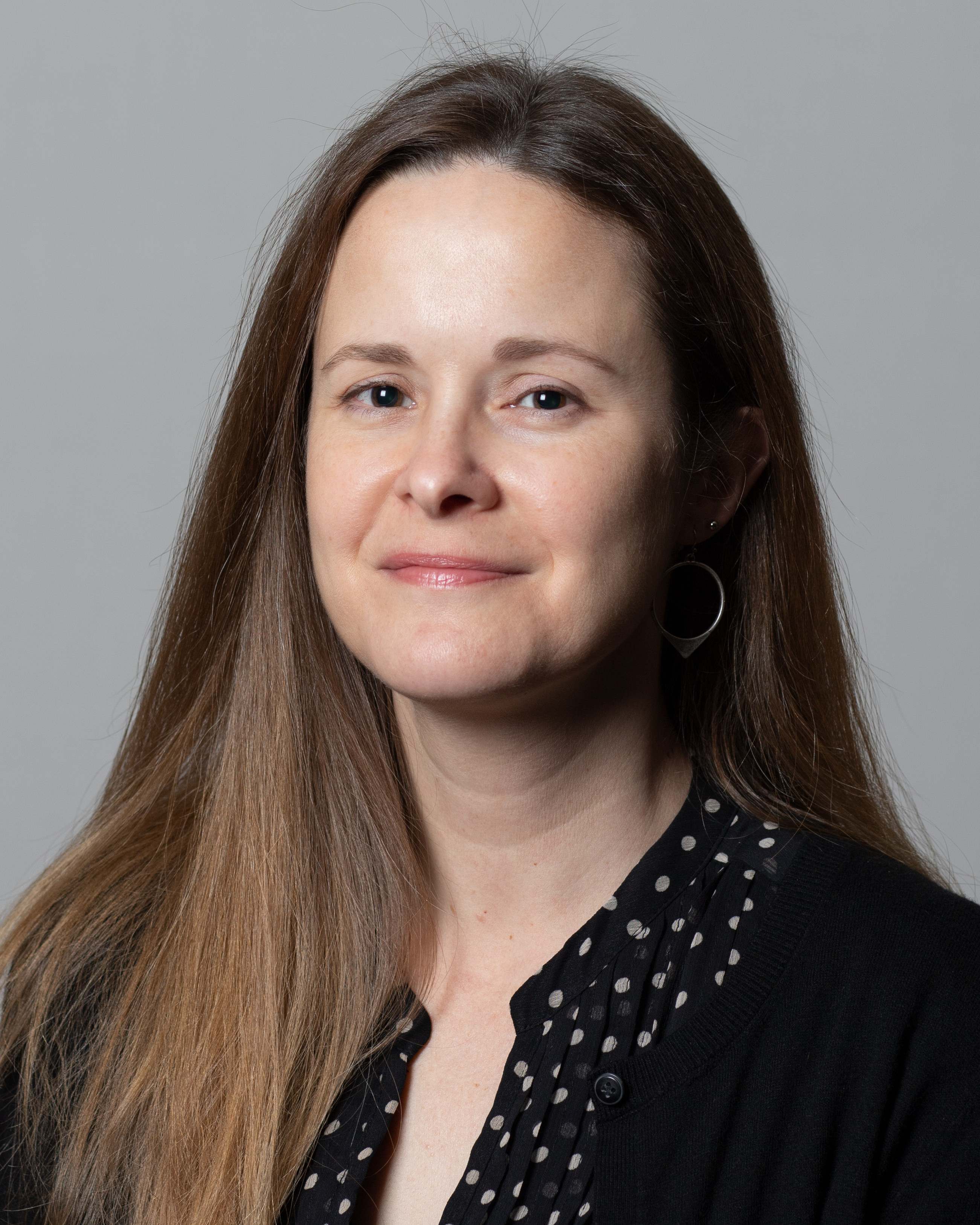
Jenny Pearson, professor of sociology, is program chair for the 2024 Midwest Sociological Society.
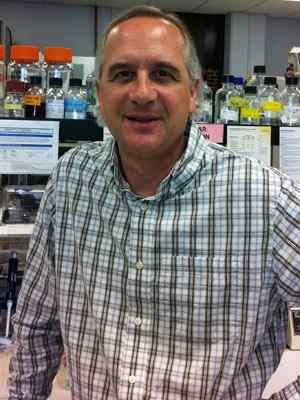
Mark Schneegurt, professor of biological sciences, was invited to participate on the panel "Discovering the Poetry in Mexican Inquisition Trial Transcripts," at the annual conference of the Society for Crypto-Judaic Studies, El Paso, in August.
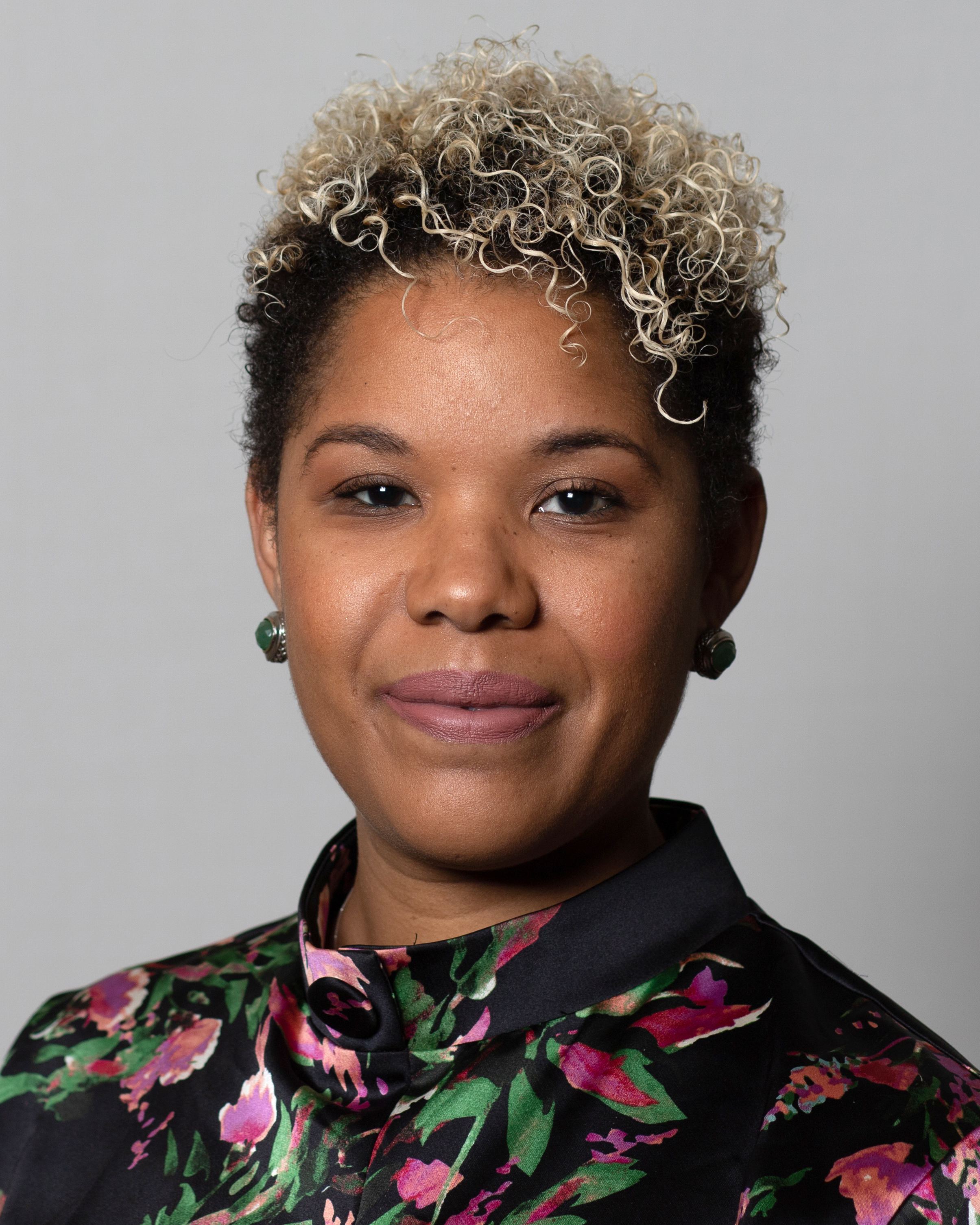
Angela Scott, academic advisor, was elected to serve a second term as membership coordinator for the Kansas Academic Advising Network. Scott is also the current chair for the Fairmount College Staff Council.
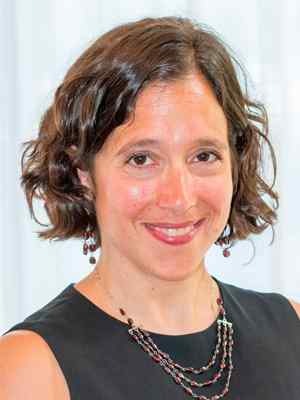
Rachel Showstack, associate professor of Spanish, gave the presidential address, "Addressing the Big Picture as a Community-Engaged Linguist," at the annual meeting of the Linguistic Association of the Southwest in Denver.
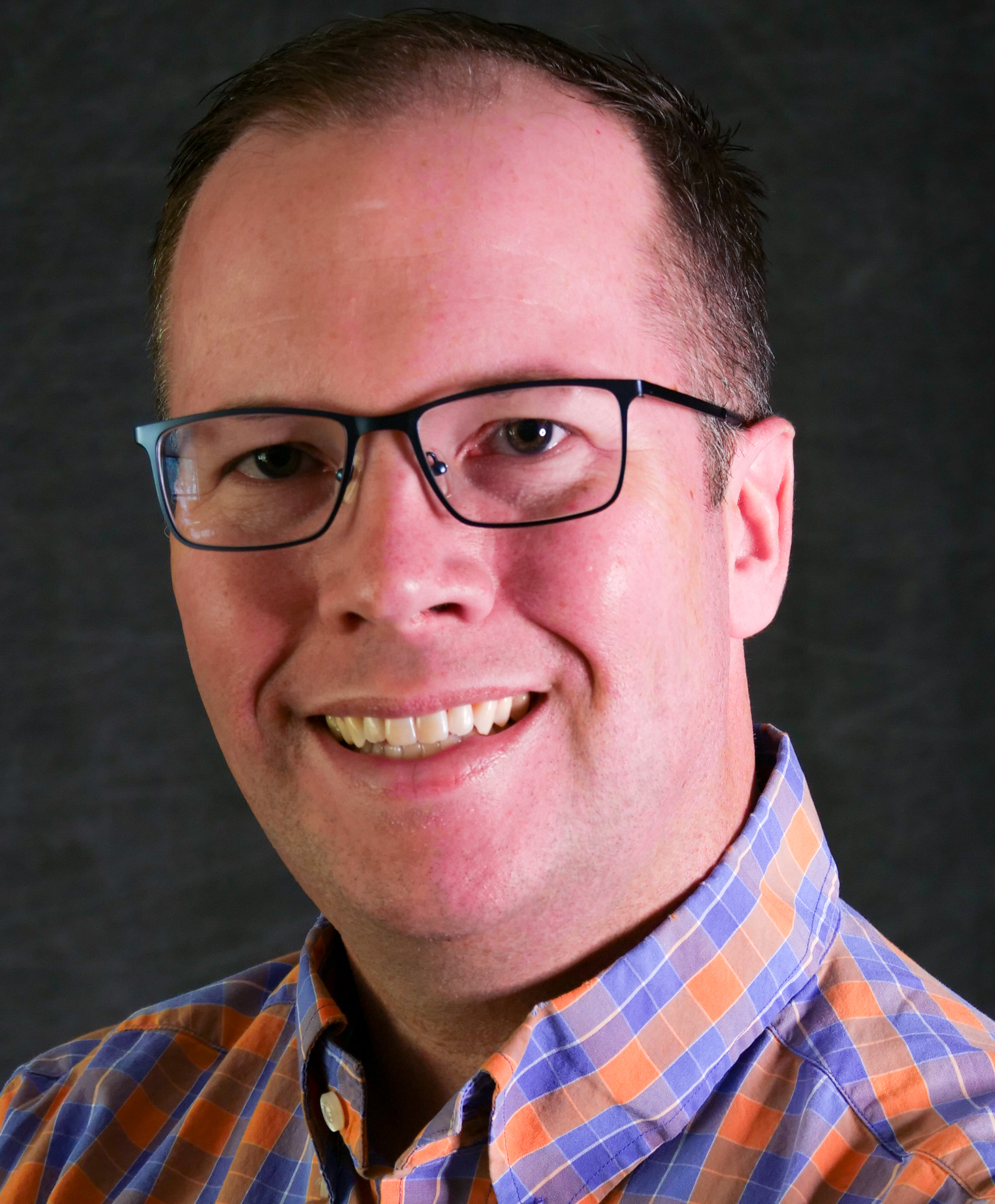
Eric Wilson, senior educator in communication, was named to a 3-year term as executive director of the Western States Communication Association, a regional organization serving faculty and students in the communication studies discipline. Wilson was selected to present a professional development and crisis communications session, "The Clock is Tikking: Fighting Misinformation on TikTok and Other Video Platforms,” at the Public Relations Society of America international conference in Nashville. He co-presented his research with Landis Tindell, APR, corporate communications manager for the Oklahoma City Thunder.
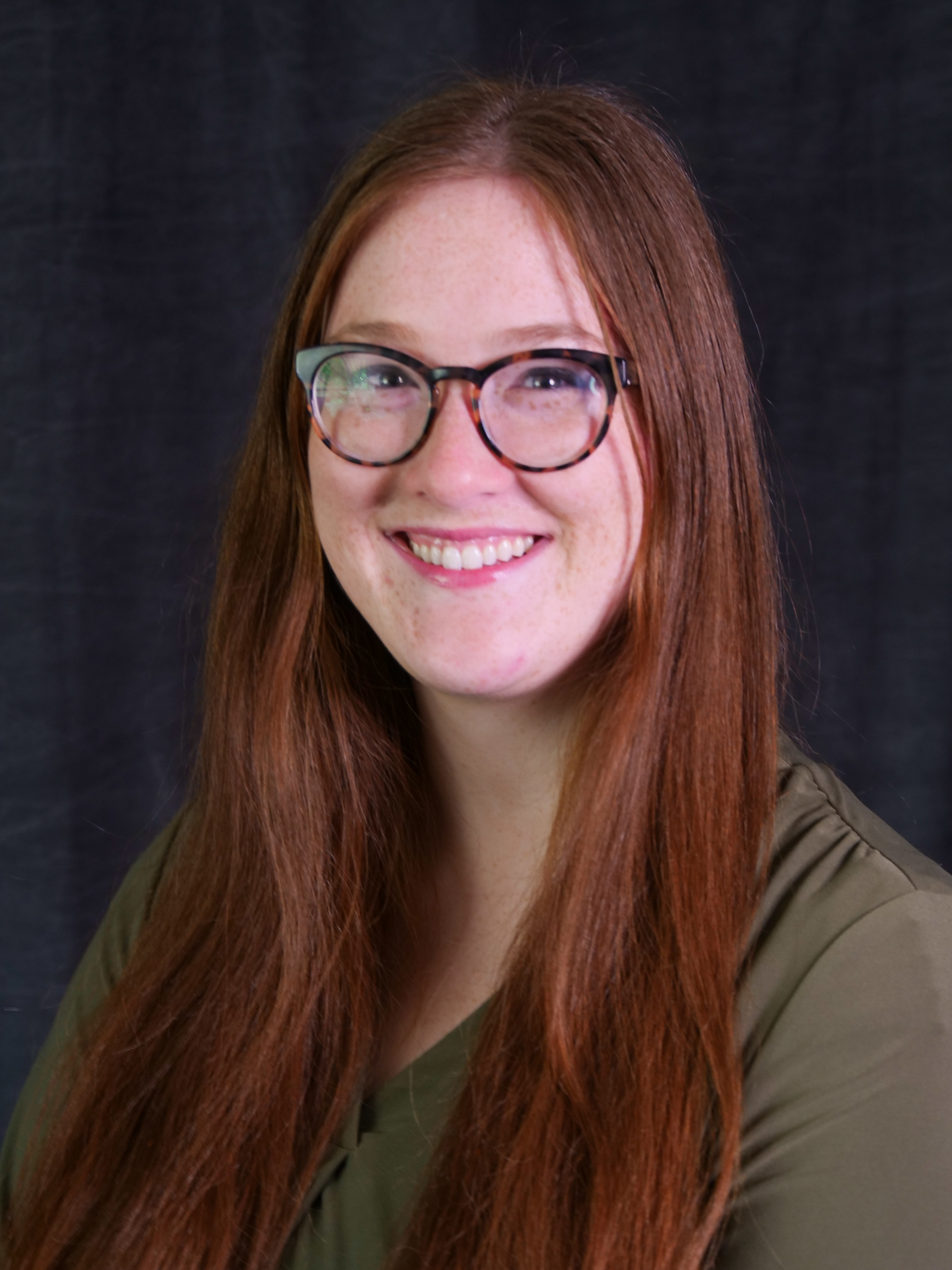
Hannah Wing, assistant professor of communication, was a special guest panelist hosted by the Dole Institute of Politics at the University of Kansas, for the panel “Taylor Swift: A Conversation on Influence & Advocacy."
Return to Newsletter Section Menu
In memoriam
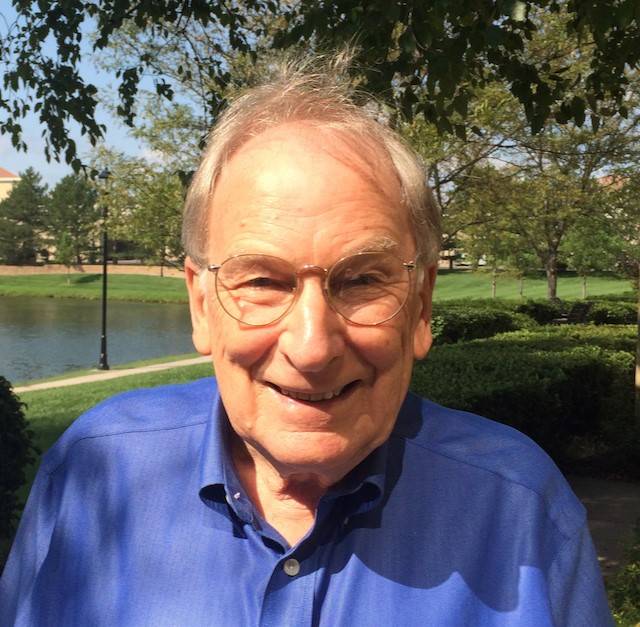
Cathy Doughty, 67, died Oct. 21. She served for 19 years as the senior administrative assistant for the women’s studies department, now known as the Department of Women’s, Ethnicity and Intersectional Studies.
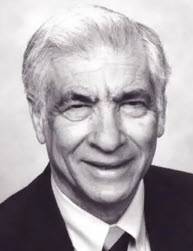
Dee Ann Pritchett, 61, died June 26. She served for 13 years as the academic and internship coordinator for the School of Community Affairs. Donations in her name may be made to either MD Anderson Cancer Center, mdanderson.org, or to Pratt Area Humane Society, prattareahs.org
William “Bill” Richardson, 86, died Sept. 6. He served as an associate professor of mathematics for 55 years. Memorials have been established with the WSU Foundation, 1845 Fairmount, Wichita, KS 67260-0002, and The Lord's Diner, 520 N Broadway Wichita, KS 67214.
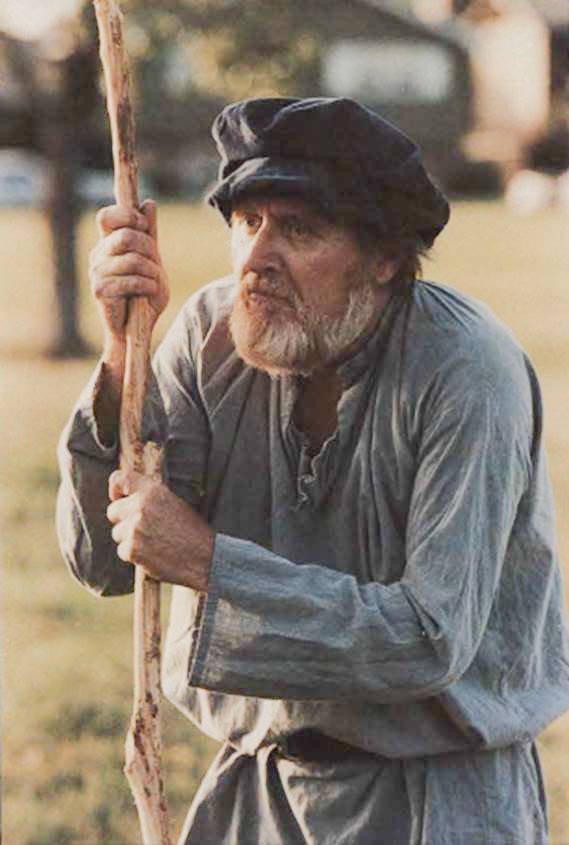
Donald R. Wineke, 88, died Aug. 5. He held a 40-year career at Wichita State as a professor of English. His local theater work included Shakespeare in the Park, the Wichita Community Theatre and Guild Hall Players.
Return to Newsletter Section Menu
Briefs
In a joint collaboration between the Ulrich Museum of Art and the Center for Educational Technologies to Assist Refugee Learners, this exhibition, “Where We Belong: Refugee Stories from Wichita,” spotlights narrated stories of refugee and asylee families in Wichita. It sheds light on the particular challenges these families face, narrates their experiences of resettlement and integration in a new life in the U.S., and celebrates their contributions to making Wichita a more diverse and culturally vibrant community. Here, several refugee learners from Syria and the Democratic Republic of Congo observe the exhibit in August.
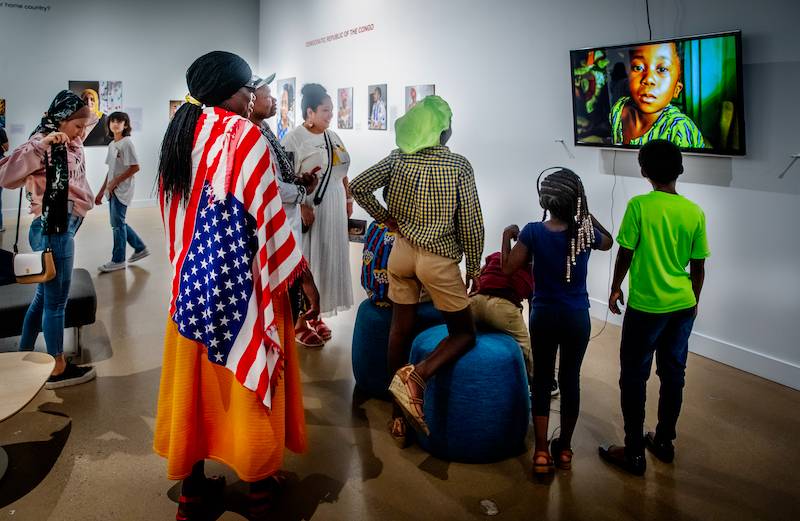
Eighteen students declared American Sign Language as their major this fall. At a welcome reception in September, faculty and graduate students from modern and classical languages and literatures joined the dean and ASL faculty and students in celebrating the creation of the major.
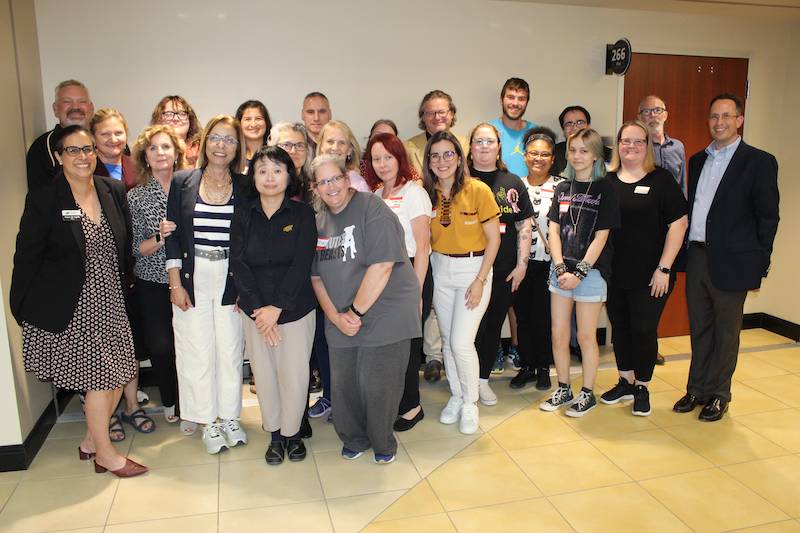
The Youngmeyer Ranch building project was awarded the highest design award, “Honor” Architectural Project, by the American Institute of Architects—Kansas in the 2023 Excellence in Design Awards. The Youngmeyer property and building are owned by the Youngmeyer Family Trust. Wichita State has research and educational access to the ranch and building.

